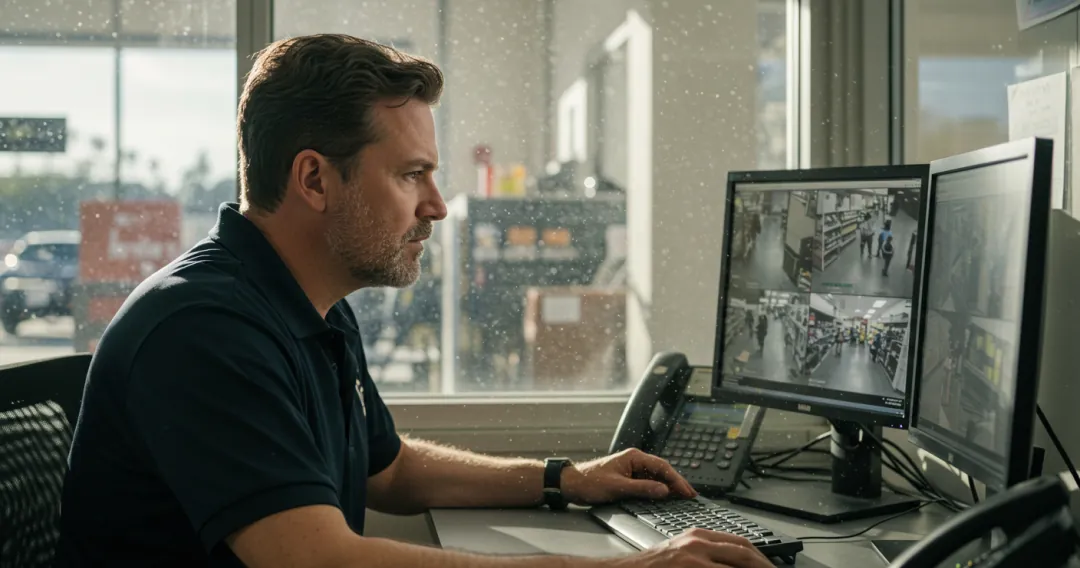Key Takeaways:
-
- “Undercover loss prevention,” often executed by “store detectives” or “asset protection investigators,” targets theft and shrinkage.
- Effective operatives possess strong observation skills, blend in, and understand relevant laws.
- Training often includes arrest techniques, while technology aids in covert surveillance and data analysis.
- Legal compliance and ethical standards are essential, alongside clearly defined objectives and a defined scope.
When You Should Consider Undercover Loss Prevention
Undercover loss prevention is not a one-size-fits-all solution. It is most effective in situations where:
-
- Internal Theft is Suspected: When there is reason to believe that employees are engaging in theft or fraud.
- Inventory Shrinkage is High: When inventory levels are consistently lower than expected, despite other loss prevention efforts.
- Operational Inefficiencies Exist: When there are concerns about employee compliance with policies and procedures.
- Traditional Methods Have Failed: When other loss prevention methods have not been effective in addressing specific issues.
How to Establish Clear Objectives and a Defined Scope
Before launching an undercover program, it is essential to establish clear objectives and define the scope of the operation. This includes:
-
- Identifying Specific Concerns: Clearly define the issues that the undercover operative will be investigating.
- Setting Measurable Goals: Establish specific, measurable, achievable, relevant, and time-bound (SMART) goals for the program.
- Defining the Timeframe: Determine the duration of the undercover assignment.
- Outlining Reporting Procedures: Establish clear procedures for the undercover operative to report findings.
- Ensuring Legal Compliance: Consult with legal counsel to ensure that the program complies with all applicable laws and regulations.

How to Select and Train Undercover Operatives
The success of an undercover program hinges on the skills and experience of the undercover operative, often referred to as a “store detective” or “loss prevention agent”. These individuals must possess a unique set of attributes to be effective in their role.
Strong observation skills are paramount, allowing them to accurately document details of employee and customer behavior – a primary tool in their arsenal.
Equally important are excellent communication skills, enabling them to build rapport while maintaining objectivity.
A thorough understanding of retail operations, including standard procedures and common theft techniques, is essential. Integrity and ethical standards are non-negotiable, as is the ability to blend seamlessly into the retail environment without arousing suspicion.
Training for these operatives typically encompasses arrest and restraint techniques, as well as education on relevant laws. In the UK, store detectives are often required to obtain an SIA license to practice legally.
Maintaining Legal and Ethical Standards
Undercover loss prevention programs must be conducted in accordance with all applicable laws and ethical standards. This includes:
-
- Avoiding Entrapment: Undercover operatives should not encourage or induce employees to commit crimes that they would not otherwise commit.
- Respecting Employee Privacy: Undercover operatives should respect employee privacy and avoid engaging in surveillance outside of the workplace.
- Maintaining Objectivity: Undercover operatives should remain objective and avoid forming biased opinions or making assumptions.
- Protecting Confidentiality: Undercover operatives should protect the confidentiality of information obtained during the investigation.
- Acting Responsibly: Undercover operatives should act responsibly and avoid engaging in any behavior that could harm the retailer or its employees.
Utilizing Technology to Enhance Effectiveness
Technology can enhance the effectiveness and efficiency of undercover loss prevention programs. This includes:
-
- Video Surveillance: Covert video surveillance can provide valuable evidence of theft or operational inefficiencies.
- Data Analytics: Analyzing POS data, inventory data, and other relevant data can help identify patterns and anomalies that may indicate theft or fraud.
- Exception-Based Reporting: Exception-based reporting systems can flag unusual transactions or activities that warrant further investigation.
- Communication Tools: Secure communication tools can enable undercover operatives to communicate with their supervisors discreetly.
- Covert Communication: Many store detectives use covert microphones and earpieces to effectively monitor suspected shoplifters.
Store Detective Techniques and Responsibilities
Store detectives use various techniques to detect shoplifters, relying on keen observation skills and teamwork with security guards. Responsibilities extend beyond shoplifting to include investigating check and credit card fraud, as well as employee theft. They commonly work with law enforcement at local, state, or federal levels.
ThinkLP and Loss Prevention
ThinkLP provides tools for managing all aspects of loss prevention, including case management, data analysis, and reporting. With ThinkLP, retailers can consolidate data from various sources, streamline incident reporting, and conduct in-depth investigations based on information gathered by undercover operatives. The platform’s analytics capabilities help identify trends and patterns, enabling retailers to proactively address vulnerabilities and
Explore ThinkLP’s Blog
Now that you know about undercover loss prevention, you can find additional insights on loss prevention and safety intelligence on ThinkLP’s blog. The blog features articles, case studies, and industry insights that provide practical tips and strategies for improving your loss prevention efforts.
Request a Demo
If you are interested in how ThinkLP’s software can support your loss prevention initiatives, we invite you to request a demo. Their Loss & Safety Intelligence Platform is designed to integrate with your existing operations, helping you reduce risks and improve efficiency. Reach out today to learn how ThinkLP can assist your organization in optimizing its loss prevention strategy.


